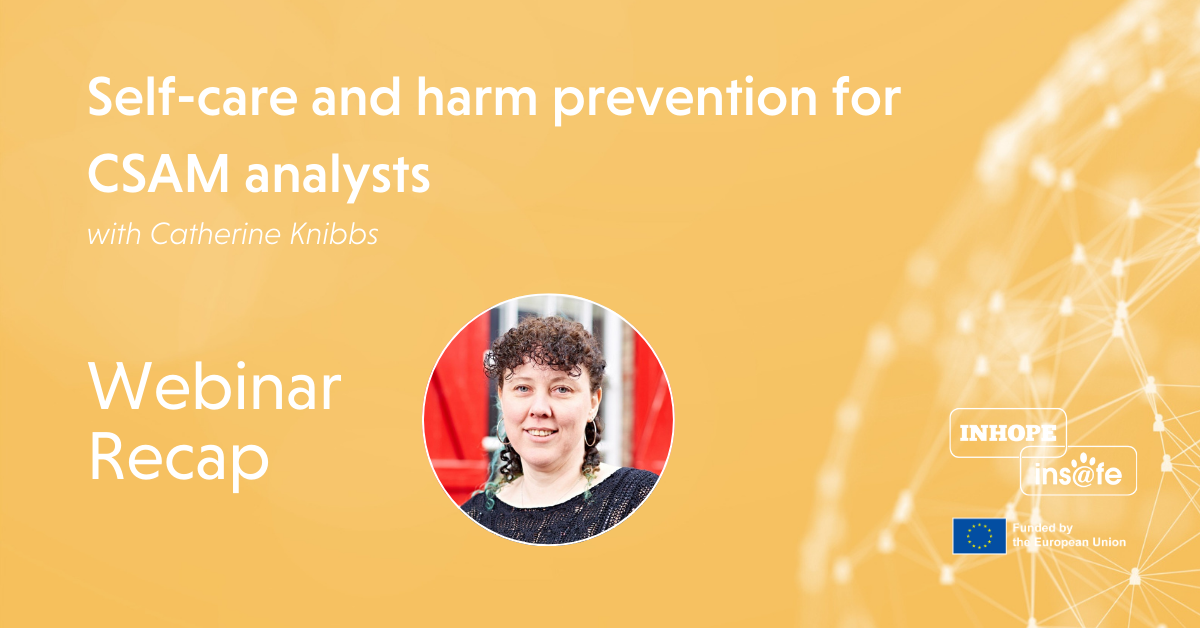Article
Events & Campaigns
Webinar Recap: Self-care and harm prevention for CSAM Analysts
Catherine Knibbs, Clinical Doctoral Researcher, Consultant, and Child Trauma Psychotherapist led our last webinar of the 2024 Expert Insights season. Over 150 attendees joined to learn about the intricate facets of cybertrauma and how to effectively prevent the negative impact of exposure to distressing content.
The Complexities of Cybertrauma
Cybertrauma is a relatively new, complex, and under-researched type of trauma. However, understanding it is crucial for developing effective strategies to mitigate its negative impacts. This is particularly important for hotline analysts who regularly review traumatic content, such as child sexual abuse material (CSAM). But understanding how cybertrauma affects each individual is complex, as each person's response to traumatic events is unique, shaped by their personal history, nervous system, and individual perception of safety. "Trauma is not necessarily just the event. It’s the story we tell ourselves, the experience we have, and how we make sense of it in that moment, and later on in the day, or in life," Catherine emphasised.
Creating a Trauma-Responsive Work Environment
Catherine explained that Analysts may become desensitised to disturbing material through frequent exposure. An absence of emotional or physical reaction, can make Analysts mistakenly believe that they don't need to prioritise self-care but without appropriate intervention, regular exposure to distressing content will inevitably impact their mental and physical health. This is why she stressed the importance of creating a trauma-responsive work environment, that prioritises comprehensive support systems that acknowledge the diverse needs of each individual employee.
This approach begins with recruitment, Catherine explained. Understanding candidates' motivations for pursuing these roles and learning about their backgrounds and personal support needs is imperative to fostering a culture of understanding and proactive support, making employees feel safe and valued. Catherine cautioned against one-size-fits-all approaches to self-care, noting that what works for one person may not resonate with another. "While mindfulness and physical activity can be beneficial, it's essential to tailor interventions to suit individual preferences and needs," she explained.
Interventions outside the Workplace
Beyond organisational support, Catherine advocates for personal wellness strategies outside of working hours. Many people, Catherine explained, are unaware of how to appropriately take care of themselves. In her presentation she outlined various measures poeple can take to regulate their nervous system. She particularly highlighted the concept of flow-inducing activities—those that fully engross individuals and foster a sense of purpose and achievement—as particularly effective in mitigating the effects of cybertrauma. This can take place through hobbies like exercise, team sports, gaming or other types of creative activities.
Get in touch with Catherine and learn more about her work here.
Please note: this webinar recording will not be made available online due to a technical error in the file. If you are interested to revisit more details from the webinar, please feel free to connect with Catherine Knibbs.

Trauma is not necessarily just the event. It’s the story we tell ourselves, the experience we have, and how we make sense of it in that moment, and later on in the day, or in life.
'